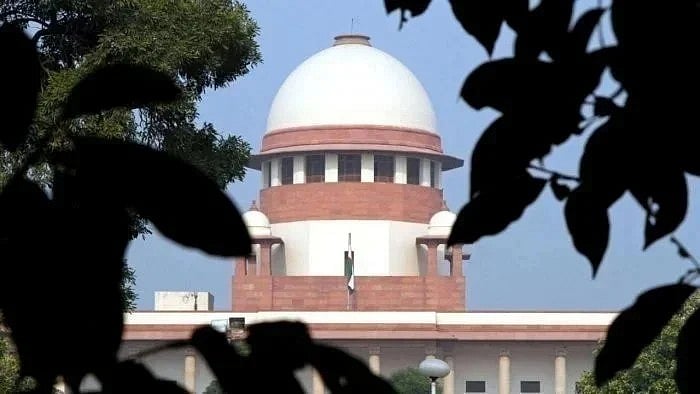
The Supreme Court of India.
Credit: PTI File Photo
New Delhi: The Supreme Court has said the power of judicial review in disciplinary proceedings is circumscribed to the extent of correcting errors of law or procedure related to manifest injustice or violation of principles of natural justice.
It also emphasised that disciplinary authority is not required to record reasons in detail if the report of the inquiry officer is accepted in case of a delinquent employee.
In a judgment on August 20, 2025, a bench of Justices Rajesh Bindal and Manmohan allowed an appeal by the State Bank of India and upheld the decision of the appellate authority of December 07, 2012 imposing punishment of ‘removal from service’ with superannuation benefits for a class IV employee, Ramadhar Sao.
"The opinion expressed by the Patna High Court's single bench that the finding recorded by the inquiry officer and the disciplinary authority were based on conjuncture and surmises, cannot be legally sustained," the bench said.
The court pointed out that if entire evidence is perused, there was no error in the findings record.
"These were based on preponderance of probabilities and strict proof of evidence beyond reasonable doubt was not required,'' the bench said.
The disciplinary authority imposed punishment of ‘dismissal from service’ upon the employee charged with taking bribe for coordination in sanction of loans. The appellate authority, however, reduced it to 'removal from service' with superannuation benefits.
Upon his writ petition, the High Court's single and division bench set aside the order of punishment and directed for his reinstatement with back wages.
Setting aside the High Court's orders, the bench said, it was not the case of the respondent that there was violation of principles of natural justice. Meaning thereby, due process was followed during the course of inquiry, the court pointed out.
"Another reason assigned by the single bench is that the respondent has been made the scapegoat and other senior officers have not been proceeded against, is also wrong as the stand taken by the bank is that the branch manager and the field officer against whom allegations were leveled along with the respondent, were removed from service," the bench said.
On a finding that the respondent being a class IV employee had no role to play in sanctioning and disbursement of loan, the court said, the charge proved against him was that he was working as a conduit in getting the loans sanctioned.
The court also noted the respondent had appeared before the disciplinary authority, where he apparently admitted his guilt and had sought mercy. In fact, leniency was shown by the appellate authority by reducing the penalty from ‘dismissal’ to ‘removal from service’ with superannuation benefits.
